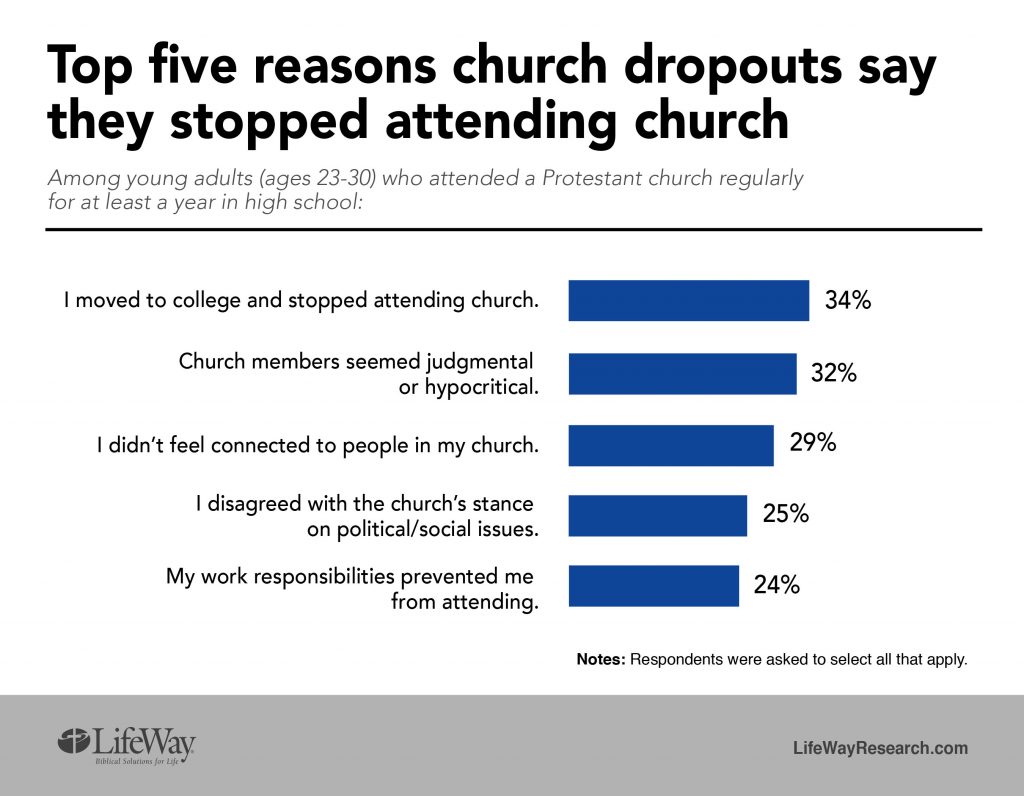
Sunday church services are usually bustling with families — young children, senior citizens, singles, and parents. However, there’s a definite lack of one demographic — young, college aged adults.
Gone are the days that growing up in the church means that an individual will continue going to church as an adult. Earlier this year, Lifeway Research found that “Two-thirds (66 percent) of American young adults who attended a Protestant church regularly for at least a year as a teenager say they also dropped out for at least a year between the ages of 18 and 22.”
These individuals may have been actively involved in junior high and youth groups. They may have even been leaders in their congregation. However, once they entered college, they found themselves no longer interested in regular church attendance.
As they age, these individuals tend to stay away from their churches. Less than half of these individuals — 39 percent of young adults aged 23 through 30 — would call themselves “devout Christians with a strong faith in God.”
An ongoing trend in declining attendance
“The good news for Christian leaders is that churches don’t seem to be losing more students than they were 10 years ago. However, the difference in millennial church attendance rates now and then is not large enough statistically to say it has actually improved,” said Scott McConnell, executive director of LifeWay Research.
Very few of those young people give people as a reason for their decision to walk away from church. As a matter of fact, an overwhelming 96 percent say that a new job, going to a new school, and an overall change of lifestyle was the cause.
This does not mean that individuals in the church were not a reason as well. According to the article, other reasons for no longer attending church included the church or pastor (73 percent); religious, ethical or political beliefs (70 percent); or the student ministry (63 percent).

But one of the largest reasons that millennial church attendance has dropped was they no longer felt connected to their home church. As a way to address this, churches across the nation are looking for ways to draw back these prodigals.
Transitioning our focus to retain millennials
This may mean breaking with old customs, which can rustle feathers with folks who want to stick with time-honored tradition. For pastors who are interested in new ways to develop a strong young-people culture in their church, the following are some options to consider.

- Empower young people to head programs
This does not mean that a young person is in charge of the finance committee. However, it could mean that a 20-something has a voice in the curriculum used during small groups. This could also be reflected in younger people giving a sermon during midweek service, or having a say in the music played during worship. - Give permission for peer led support
Ministering to millennials and young people needs to be done by individuals who understand them best. Having young adults in this demographic — with support and guidance from more mature ministers and church leaders — has two benefits. First, folks looking for a sympathetic ear will have a chance to talk with someone who truly relates to them before giving them spiritual support. In addition, those serving in supporting roles feel that they have an important position in church, anchoring them.
“We should help them identify the gifts given to them by God and use them, deploy them, unleash them in the church,” said Jonathan “J.P.” Pokluda, a former teaching pastor at Watermark in a recent article about innovative ministries. - Cultivate collaboration
Research finds that millennials and younger generations need to feel that their input matters. When it comes to special services, new ministries, and outreach events, these individuals want to feel like their opinions and voices are being heard. Giving credence to their opinions, and actually taking their input in the development of events will go a long way in making these individuals feel like they matter. - Authentically embrace returning millennials
Word spreads fast when a church offers uniquely tailored options for young adults and millennials. This can be a special outreach, services, or just youth-driven Bible Studies. But when millennial church attendance sees a spike, and they do start to come and see what your church offers, embrace them with love. Do not make them feel chagrined for their time apart, but excited about the time they have left to give back to the Kingdom.
